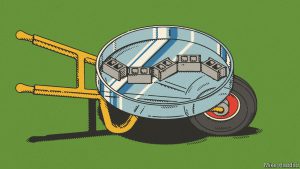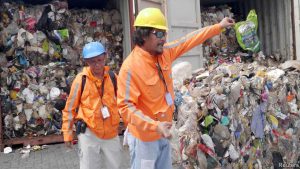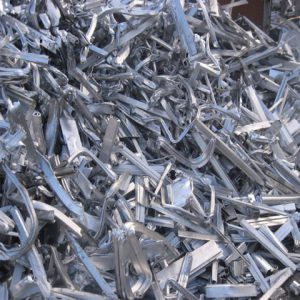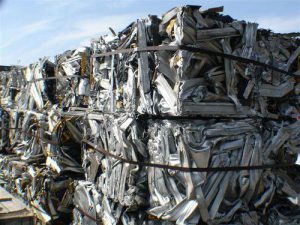George Hatzimanolis, CEO of Repurpose It at the Bark King mulch plant in Epping, Vic. Pic: Leigh Henningham
- By JACKSON HEWETT
- 12:00AM JULY 9, 2021

As councils around the country look for ways to manage household waste more sustainably, Melbourne-based Repurpose It is hoping to turn the contents of that green wheelie bin into gold.
Founded in 2017, Repurpose It has doubled in staff and turnover every year as a processor of waste material from major construction sites. It takes that material for a fee, sorts and cleans it, and sells it back to the industry. So far they’ve recycled 400,000 tonnes of waste, diverting about 60,000 tonnes of CO2 from the atmosphere.
Now Repurpose It is integrating deeper into the value chain with the recent purchase of Bark King, a 46-year-old family firm that is one of the largest suppliers of bark mulch to Melbourne’s landscape businesses.
Bark King currently turns offcuts from the timber industry into garden mulches and soils, but the ambitions of Repurpose It’s founder and chief executive George Hatzimanolis are much greater.
Hatzimanolis wants to put his company squarely in the middle of the circular economy, and the local council’s humble green bin will be a key supplier.
“700,000 tonnes of organic waste will need to be diverted from landfill over the next nine years in Victoria, and a lot of that will come from domestic collections,” Hatzimanolis says.
“A lot of that waste is sent out to regional facilities to be processed and sent to farms but it’s becoming constrained.
“We think there is a sustainable local market here in Melbourne.”
With a $40m investment in European recycling technology at their plant in Melbourne’s north, Repurpose It will eventually be able to divert 200,000 tonnes of organic waste from landfill.
The acquisition of Bark King will allow the company to mix both household organics and construction material processed waste into garden products for a retail market. And they get paid to take their input product. Repurpose It has already signed a $20m contract over the next 10 years to take household organics from the City of Whittlesea council in Melbourne, and expects to sign up more councils as Victoria tries to divert 80 per cent of its green waste from landfill.
“The cost to councils to send to landfill is going up by more than 50 per cent in the next three years,” Hatzimanolis says.
“We’re giving them an opportunity to have a long-term offtake that will be less than that increase and give them some security about their disposal costs.”
The four-year-old company needs a competitive edge if it is to win business from giant waste multinationals such as Suez and Veolia.
“It’s always a bit daunting going into a market that’s been dominated by large multinational waste companies,” he says.
“But we’re a local business that has been a trusted and reputable operator.
“We’ve now received two Premier Sustainability Awards in 2020. And we recognise that that old model needs to be challenged because we need to take more accountability for the waste we use and how we can recover it.”
The $40m investment in new plant and facilities across the next three years is anticipated to be a major factor to help compete with the majors.
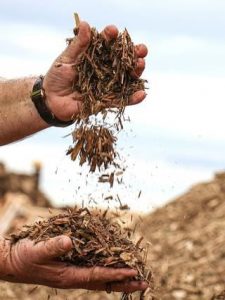
Recycled bark will be mixed with composted food waste
Repurpose It has imported sorting and processing technology that separates waste to the highest EU standards. It is capable of extracting organic waste from current packaging, including bags of bread, cans of tomatoes or bottled juice, and divert the organic and inorganic material to separate waste streams. It will also be able to work with the new compostable packaging that will be introduced by supermarkets as they move away from single-use plastics, which is expected to form an increasingly large part of household rubbish.
“Compostable packaging is going to be a huge problem under conventional outdoor, open composting,” Hatzimanolis says.
“Often it biodegrades over longer periods of time than what a conventional composting process would take: 20-30 weeks versus 12 weeks for standard compost inputs. Our process will be able to handle that more robustly than conventional processes.”
The plant is also designed to generate its own energy by converting the remaining pulp into biogas. Once fully operational, Hatzimanolis expects it will produce 2MW of energy, enough to power both the building waste and food waste parts of the business.
“Repurpose It will be a resource-recovery business fully off the grid,” Hatzimanolis explains.
The major investment in both Bark King and the facilities have been fully financed by the ongoing success of the original construction waste business.
The enormous volume of construction work now going on in Victoria, with additional stimulus spending to generate even more, means that Repurpose It has a steady pipeline of revenue well into the future.
It is expanding plants across Melbourne and ultimately hopes to head interstate.
The trend is their friend, Hatzimanolis says. “Ultimately people want to operate in a circular economy. And that’s what we’re really striving to establish.”
Link: https://www.theaustralian.com.au/business/small-business/betting-chips-on-green-for-recycling-payday/news-story/e8eb9bc40c2b22d60e6d432b1c9958c5
